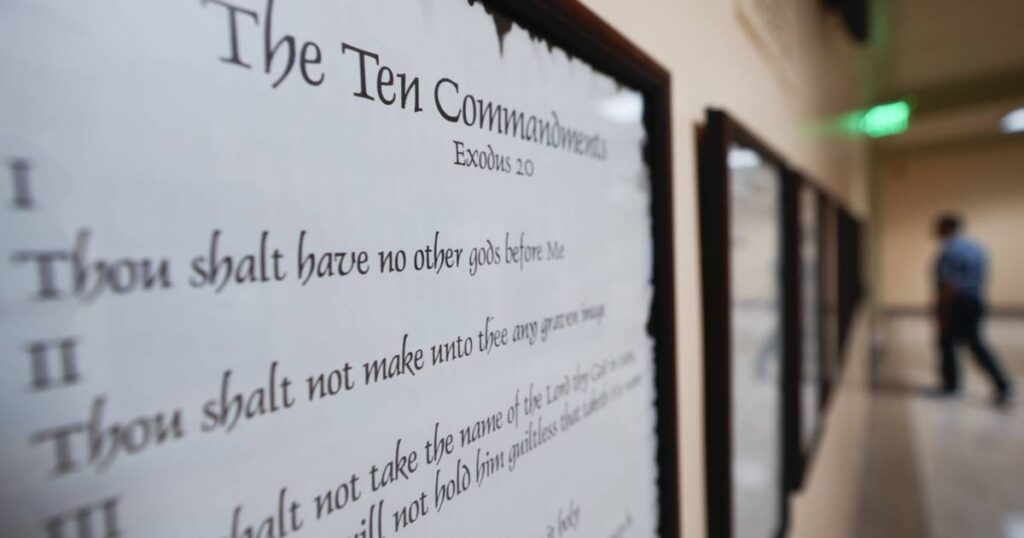![]()
Louisiana's Republican governor, Jeff Landry, signed a bill this week requiring the Ten Commandments to be displayed in classrooms. The bill's sponsor, Republican Rep. Dodie Horton, said the Ten Commandments are “the foundation of all law in the state of Louisiana” and that the law honors the state's religious origins. Louisiana Republican Sen. Jay Morris said the Ten Commandments “are the foundation of our nation's history and our legal system.”
The claim that these commandments have a historical connection to our country's laws is dubious at best. Only three of the Ten Commandments are reflected in our country's laws: Thou shalt not murder, thou shalt not steal, and thou shalt not bear false witness. These three are illegal in other cultures that have not been influenced by the Ten Commandments in any way.
The other commandments on the list are more problematic: “Thou shalt have no gods before me” is a reference to the state's excluding other religions; “Thou shalt not take the name of God in vain” is a clear act of the state restricting freedom of expression; and these posters will have many a kindergartener asking what “adultery” means.
On a deeper level, the form and content of what they call the “Ten Commandments” varies by religion, denomination, and denomination. By choosing one list and numbering system, Louisiana has codified and established the priority of one faith over another. The Bible itself does not speak with a unified voice either. There are various commandments (Exodus 20, Exodus 34, Deuteronomy 5), and there are over 600 commandments in the Bible. Selecting these ten commandments is not an act of legislation, it is an act of religion, and the Louisiana State Legislature has no competence or authority to do so.
Similarly, the law chooses the King James Version, which is just one of many options for the English Bible. Not only that, it also edits and removes significant portions of Bible verses. Any educated preacher will tell you that removing words can change the meaning of a verse. For example, the law omits Exodus 20:9-10, which says, “Six days you shall labor and do all your work. But the seventh day shall be a sabbath to the LORD your God. You shall not do any work in it, you, or your son, or your daughter, your male servant, or your female servant, or your livestock, or the stranger who is within your gates.” This verse seems to strongly support workers' rights, which is why they decided not to include it in the policy, even though it is sufficient in the Bible.
All of these choices have deep theological implications, but the Louisiana Legislature either doesn't know about them or doesn't care. Neither is acceptable. With this law, the same party that criticizes government overreach and speaks for religious freedom is now using the power of the state to establish one acceptable expression of religious belief. With this law, the same party that cries “indoctrination!” about the teaching of accurate history or the acknowledgment of the existence of homosexuals is now literally indoctrinating — or indoctrination — elementary school students.
The ACLU has already filed a lawsuit, so we can hope that this law will be overturned and the damage to education will be minimal. But what about the damage to churches? This law weaponizes religion, transforming it from a path to meaning and compassion into a club to subjugate people to one local sect's appropriation of ancient traditions.
If Louisiana's elected officials had used their positions to practice the biblical teaching of caring for those in need rather than forcing their lifestyles on people, perhaps Louisiana would not be ranked last in the nation for child food insecurity. When a religion practices acts of mercy and service to the poor and hungry, it does not need to plaster its walls with posters listing virtues it systematically fails to practice.
This law is another example of politically motivated doctrine being spouted without thought or consideration for others. Does Louisiana really want thoughtlessness to be how the Bible portrays it?
The Rev. Matthew Schultz is an Anchorage pastor and a member of Christians for Equality's steering committee.
Opinions expressed here are those of the author and are not necessarily endorsed by the Anchorage Daily News, which welcomes a wide range of viewpoints. To submit an article for consideration, email commentary(at)adn.com. Submissions of under 200 words may be sent to letters@adn.com or click here to submit from any web browser. Read our complete guidelines for letters and commentary here.



